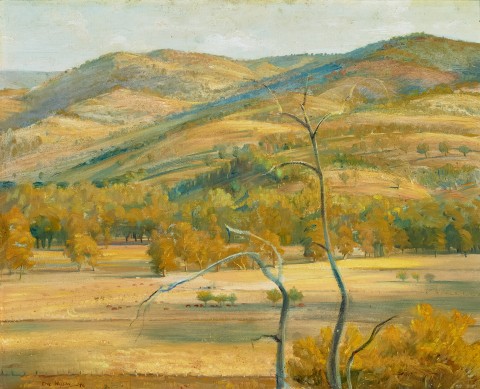YABTREE HILLS, WANTABADGERY, 1946
ERIC WILSON
oil on canvas board
40.5 x 50.5 cm
signed and dated lower left: Eric Wilson ‘46
signed and inscribed with title verso: SKETCH / YABTREE HILLS. / Eric Wilson
Sir Keith Murdoch, Cruden Farm
Thence by descent
Dame Elisabeth Murdoch, Cruden Farm, Victoria
Thence by descent
Private collection, Melbourne
Upon his return to Australia in 1939 following the outbreak of the Second World War, Wilson first embarked upon an impressive series of European streetscapes inspired by his travels abroad (see lot 45), before once again turning his attention to capturing the rural landscape of his homeland. Although the Australian landscape posed quite different challenges to the painting of European urban scenes, his early investigations such as Bushpiece Berowra, and Burnt Trees, both dated 1945, echoed the approach employed by Wilson in the careful construction of his streetscapes, with the magnified trees, bushes and rocks of the foreground serving as architectural elements within which space is articulated. Even amidst the chaotic untidiness of the Australian bush, Wilson’s architectural interests here predominate, with an emphasis on balance and the structural logic of the composition signalling the artist’s conscious return to his earlier Ozenfant training.
In December of 1945, Wilson was invited by Sir Keith Murdoch to paint at his property on the Murrumbidgee River, Wantabadgery, near Wagga in New South Wales. Fascinated by this new landscape with its lush rolling hills, contorted tree trunks and sun-bleached, golden paddocks, Wilson thus commenced what would be his last major series of paintings, splendidly encapsulated here by Yabtree Hills, Wantabadgery, 1946. While derived from his time spent exploring the property, significantly such works were not faithful reproductions of what he perceived; rather Wilson’s overriding interest lie in producing a synchronous whole in which the subject was respected only to the degree that it offered shapes, lines, colours, textures and rhythms. Accordingly, in a manner akin to both his European streetscapes and earlier Australian landscapes from the same year, the principles of abstraction which he had elaborated upon two years earlier continued to influence his vision. As Wilson mused in 1943, ‘…in whatever idiom [is] chosen for expression, plastic values are my main consideration. It is this emphasis on the architectural quality – the orchestration of the formal elements into a symphonic whole – that I find most sympathy with in the modern movement.’1
For indeed, despite the frequent categorisation of Wilson’s oeuvre into distinct groups of landscapes vis à vis abstracts, throughout all his myriad achievements it was this disciplined restructuring and orchestration of formal elements that would remain his singular aim - and ultimately, his legacy for Australian art and theory of the 1940s.
1. The artist cited in Plate, C., ‘Eric Wilson’ in Ure Smith, S., Australian Present Day Art, Waite and Bull, Sydney, 1943, p. 92
VERONICA ANGELATOS
